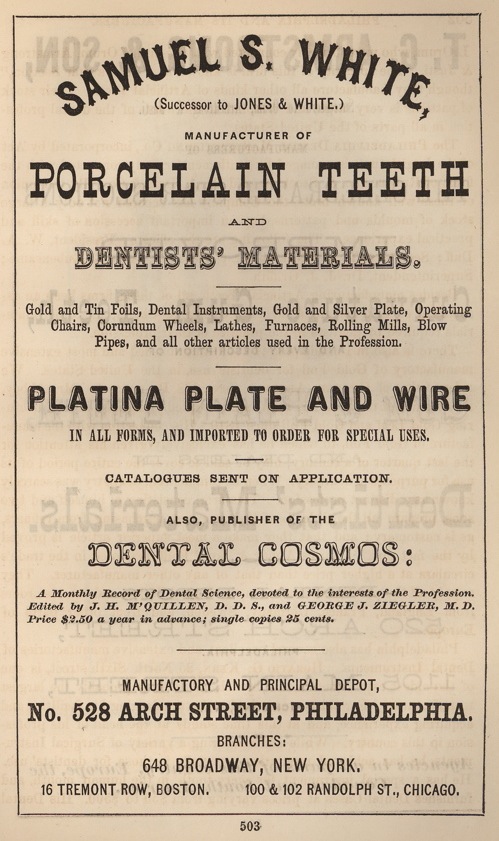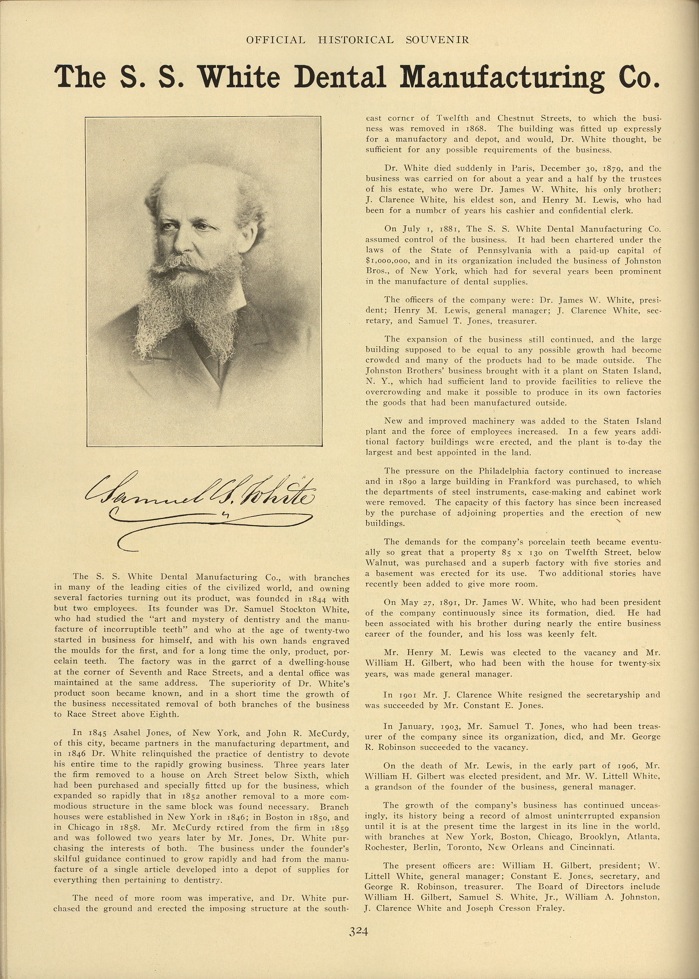12th & Chestnut Streets, 12th & Locust Streets, Philadelphia PA 19107
© Helene Schenck & Michael
Parrington, Workshop of the World (Oliver Evans Press,
1990).
In 1844, Samuel White, then
22 years old, began manufacturing artificial teeth at 116
N. Seventh Street, working in an attic over a first floor
store.
Up
to that time, dentists carved crude teeth from blocks of
porcelain . . . Young White strove to make his dental
work resemble the original as nearly as possible.
His success was accelerated by the accidental
discovery of feldspar as a base for porcelain, and within
a short time he and two assistants were forced to seek
larger quarters. 1
In a Philadelphia city directory for 1865, an ad for
Samuel S. White describes the firm as "manufacturers of
Porcelain teeth, gold and tin foils, dental instruments,
gold and silver plate, operating chairs, corundum wheels,
lathes, furnaces, rolling mills, blow pipes." They also
apparently published the Dental Cosmos, "A Monthly Record
of Dental Science." 2
By 1883, the firm, listed as the S.S. White Manufacturing
Co., moved to 12th and Chestnut Streets, and employed 361
people. 3
Here the firm
occupied a new building with forges in the basement and
on the fourth floor for making the instruments. The
fourth floor was also where the hardwood handles of the
tools were formed. The ground floor was leased to Baily
and Co., jewelers.The White Company expanded into the
second location at 12th and Locust Streets (formerly the
site of a public school) in the early 20th century.
It was then employing 500 workers, who manufactured
instruments from amalgams of steel, nickel, and precious
metals. 4
Today the
building at 12th and Locust Streets houses luxury
apartments; the 12th and Chestnut Street building
is occupied by retail shops and offices.
1 Federal Writers'
Project, Philadelphia:
A Guide to the Nation's
Birthplace,
(Works Progress Administration for Pennsylvania,
Harrisburg, 1937), p. 119.
2 McElroy's
Philadelphia Directory (1865).
3 Lorin Blodget,
Census
of Philadelphia Manufactures (Philadelphia, 1883), p. 152.
4 Philip Scranton and
Walter Licht, Work
Sights: Industrial Philadelphia,
1890-1950, (Philadelphia, 1986), pp.
85-86.
Update May
2007 (by
Harry Kyriakodis):
Still standing. The White Building was converted from an
apartment house into a condominium in a $7 million
renovation completed in 2006.

© Edwin T.
Freedley, Philadelphia
and its Manufactures (1867), p.
503.
© William Mátos,
compiler, Philadelphia,
Its Founding and Development, 1683-1908
(Philadelphia, 1908), p.
324.